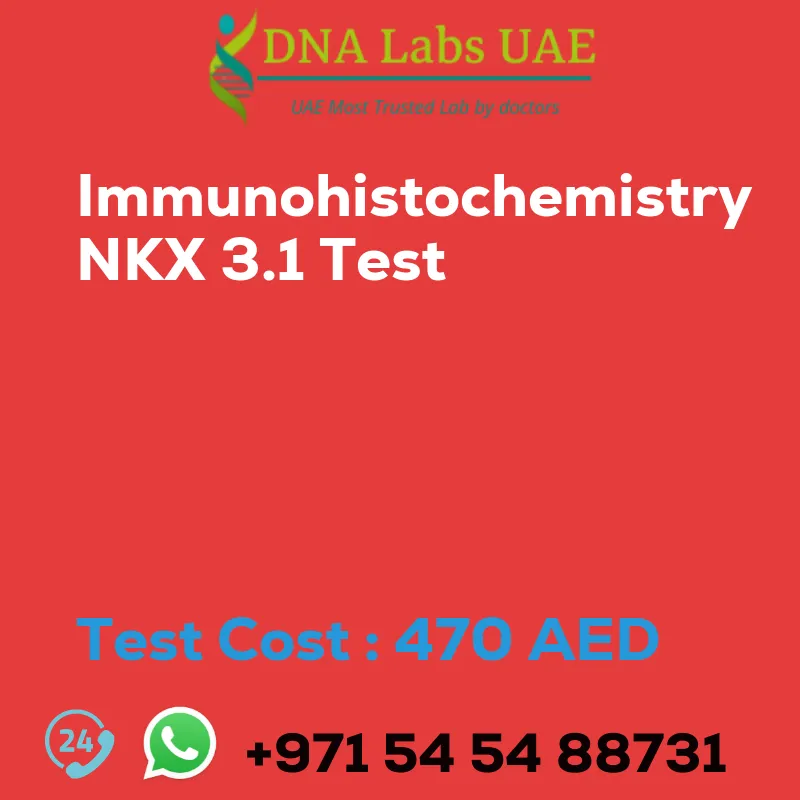IMMUNOHISTOCHEMISTRY. NKX 3.1 Test
At DNA Labs UAE, we offer the NKX 3.1 test, an immunohistochemistry (IHC) test used to detect the expression of the NKX 3.1 protein in tissue samples. This test is particularly useful in distinguishing between benign prostate tissue and prostate cancer.
Test Components
- Test Name: IMMUNOHISTOCHEMISTRY. NKX 3.1 Test
- Components: IHC
- Price: 470.0 AED
Symptoms and Diagnosis
The NKX 3.1 test helps in the diagnosis of prostate cancer by assessing the presence or absence of NKX 3.1 protein in prostate tissue samples. Loss of NKX 3.1 expression is often observed in prostate cancer, while it is maintained in benign tissue. The results of this test can provide important diagnostic and prognostic information in prostate cancer cases, helping to guide treatment decisions and predict the likelihood of disease progression.
Pre Test Information
The NKX 3.1 test requires a formalin-fixed paraffin-embedded tissue block or tissue in formalin. The sample should be shipped at room temperature. The test is performed using the immunohistochemistry method in our histology department.
Report Delivery
The sample is processed daily, and the report is delivered within 3 days for block samples and 5 days for small specimens.
Test Department and Doctor
- Test Department: HISTOLOGY
- Doctor: Oncologist
Method and Test Type
The NKX 3.1 test is performed using the immunohistochemistry (IHC) technique. Specific antibodies that bind to the NKX 3.1 protein in tissue sections are used, which are labeled with a marker such as a fluorescent dye or an enzyme. This allows visualization of the protein’s presence. The tissue sections are then examined under a microscope to determine the level of NKX 3.1 expression. The test type is cancer-related, specifically for prostate cancer.
It is important to note that the NKX 3.1 test is just one tool used in the evaluation of prostate cancer and should be interpreted in conjunction with other clinical and pathological findings.
| Test Name | IMMUNOHISTOCHEMISTRY. NKX 3.1 Test |
|---|---|
| Components | IHC |
| Price | 470.0 AED |
| Sample Condition | Formalin fixed paraffin embedded tissue block\/Tissue in formalin. Ship at room temperature.. BRIEF CLINICAL HISTORY IN SURGICAL PATHOLOGY REQUISITION FORM FOR ONCOLOGY RESECTIONS… |
| Report Delivery | Sample Daily by 6 pm; Report 3 Days for Block and 5 days for small specimen |
| Method | Immunohistochemistry |
| Test type | Cancer |
| Doctor | Oncologist |
| Test Department: | HISTOLOGY |
| Pre Test Information | |
| Test Details |
The NKX 3.1 test is an immunohistochemistry (IHC) test used to detect the expression of the NKX 3.1 protein in tissue samples. NKX 3.1 is a transcription factor that plays a role in the development and function of the prostate gland. The IHC technique involves using specific antibodies that bind to the NKX 3.1 protein in tissue sections. These antibodies are labeled with a marker, such as a fluorescent dye or an enzyme, which allows visualization of the protein’s presence. The tissue sections are then examined under a microscope to determine the level of NKX 3.1 expression. The NKX 3.1 test is commonly used in pathology to assess the presence or absence of NKX 3.1 protein in prostate tissue samples. It is particularly useful in distinguishing between benign prostate tissue and prostate cancer. Loss of NKX 3.1 expression is often observed in prostate cancer, while it is maintained in benign tissue. The results of the NKX 3.1 test can provide important diagnostic and prognostic information in prostate cancer cases. It can help guide treatment decisions and predict the likelihood of disease progression. However, it is important to note that the NKX 3.1 test is just one tool used in the evaluation of prostate cancer and should be interpreted in conjunction with other clinical and pathological findings. |








